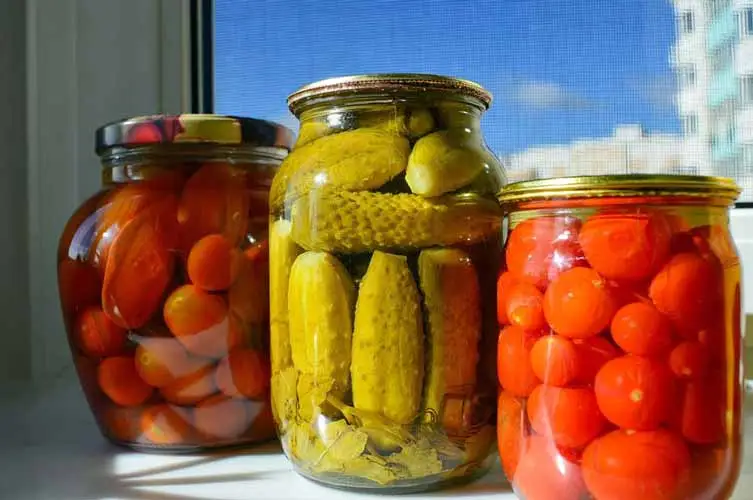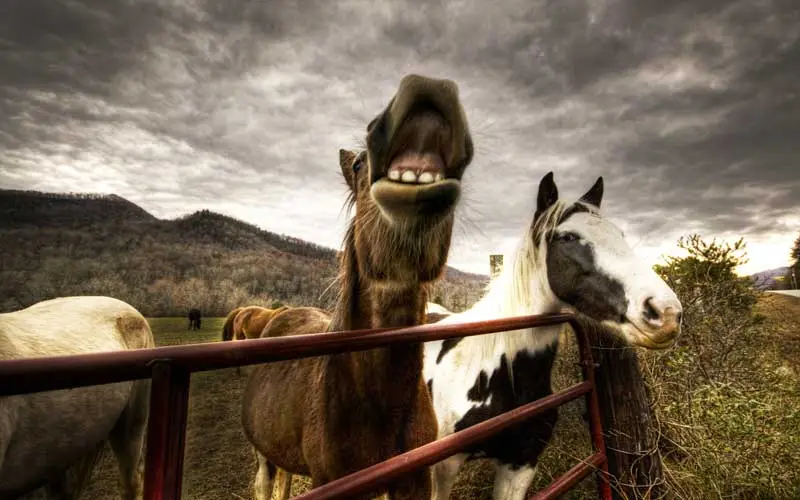I don’t know about you but……
The moment someone says pickles, my mouth starts salivating.
Something about those sour, crunchy pieces of pickles makes me want to keep eating them forever.
Recently, I started wondering if my favorite animal, horses, like me, can eat and enjoy pickles as much as I do. Can horses eat pickles?
Usually, horses are not a big fans of pickles. But horses can eat pickles if the primary ingredients are fresh fruits or vegetables and consumed in moderation. It is important to be careful when giving pickles to horses because too much of spice can be harmful. Additionally, picking cucumbers from the ground can be difficult for horses, which could lead to digestive problems if picked improperly.
The weird reaction of the Horse!!! Do horses like pickles?
Usually No, But Some horses are fond of pickles.
Pickles are salt-cured vegetables with an acidic taste and distinct crunch, making them so good. Pickles get their distinct taste from brine or vinegar.
Dr. Clarissa Brown notes in her article for Kentucky Equine Research, “the taste of cider vinegar is appealing to some horses” and can be fed in small quantities.
Whether your horse likes pickles or not is something you will have to test with trials and errors, but a few people have had real success feeding pickles to their horses.
Are pickles toxic to horses? Reveal the researchers’ report
Pickles are not toxic to the horses. In moderation, pickles wouldn’t really hurt a horse. However, the lack of research on the toxicity of pickles for the horses leaves the subject ambiguous at best.
The raw materials used to make the pickles are safe for the horses.
Dill, which adds more flavor and depth to the pickle, is non-toxic, though it might cause contact dermatitis in some horses. Generally, dill aids in digestion and is good for the nerves.
Researchers at Cornell University have found that horses with one cup of apple cider vinegar tend to have more colonic acid reflux.
Also read: Can Horses Eat Cattails?
These acidic conditions in the hindgut lead to a decline in good fiber-digesting bacteria and encourage the growth of harmful gut bacteria, negatively affecting nutrient absorption.
Even this acidic condition is good when the Horse has a mineral concentration in its intestines. Pickle juice, made from vinegar, can help dissolve these small stones.
What’s the bottom line?
Pickles are not toxic by any means if consumed in a small quantity. You should not feed pickles to your horse by the bucketful.
Related: The 9 Surprising Home Remedies for Cracked Horse Hooves
Are cucumbers poisonous to horses? Things You Need To Know
Cucumbers are not poisonous to horses, the most famous type of vegetable used in pickle preparation.
In fact, cucumbers are a good source of Vitamin A, Vitamin K, Vitamin C and potassium, as well as dietary fibers.
This vegetable is low-caloric and low in carbohydrates and helps prevent obesity in horses. Since cucumbers are 95% water, they are a great way of keeping your Horse hydrated.
However, these benefits can become detrimental when cucumbers are consumed in excess. On multiple occasions, increased consumption of cucumbers led to digestive issues like colic and gas in horses.
Since horses can’t vomit or belch, gastric ruptures from trapped gas and indigestion are the worst-case scenario.
Hyperkalemic Periodic Paralysis is a health condition that leads to excess production of potassium in the blood. Cucumbers, which are rich in potassium, can be deadly if your horse suffers from this genetic disease.
Generally, cucumbers are not harmful to your horses, but before making cucumbers part of the feeding routine for the horses, make sure to consult with the vet and closely monitor the animals’ health.

What can horses eat and not eat?
Since horses have a complicated digestive system with a unique microbe environment, it is important to know the foods you can feed your horses.
Feeding your horse hay, grass, and some grains with molasses is completely fine. Horses love sweet things, so fruits including apple, banana, peach, melons, grapes and citrus fruits are great options. Be mindful to remove the cores and deseed the fruits and vegetables.
What about veggies?
Most vegetables like cucumbers, carrots, turnips and celery are good in moderate quantities. You should avoid giving your cruciferous horse vegetables, including cabbage, broccoli, avocadoes, rhubarb and tomatoes.
Potatoes also fall within the foods you need to avoid.
Foods including onions and garlic also should be avoided since they damage the red blood cells and lead to compromised health of the horses.
Moreover, the following foods must be avoided at all costs to ensure the good health of your Horse:
- Dairy products. Some horses can be lactose intolerant which can cause digestive issues.
- Caffeine and chocolate. Caffeine can lead to increased, irregular heart rate, and chocolate contain theobromine which, if consumed in large quantities, can cause internal bleeding, seizures, and colic in horses.
- Bran products. Although not outrightly poisonous, bran products can get stuck in the throat and lead to choking.
- Meat products. Horses are herbivores by nature and should not be fed meat.
Verdict
Horses love food, but their complicated digestive systems need a proper balance of a healthy and tasty diet.
Like most foods, it is safe for horses to eat pickles because the raw materials are not harmful.
You simply need to keep an eye on how well your Horse reacts to it and control the portion sizes. Vegetables can provide the dietary fibers for good digestion. Vinegar in moderation can provide the right kick and keep the gut pH level balanced.
But again………..
Consult your vet and treat your Horse with these crunchy, salty, and sour pickles!



